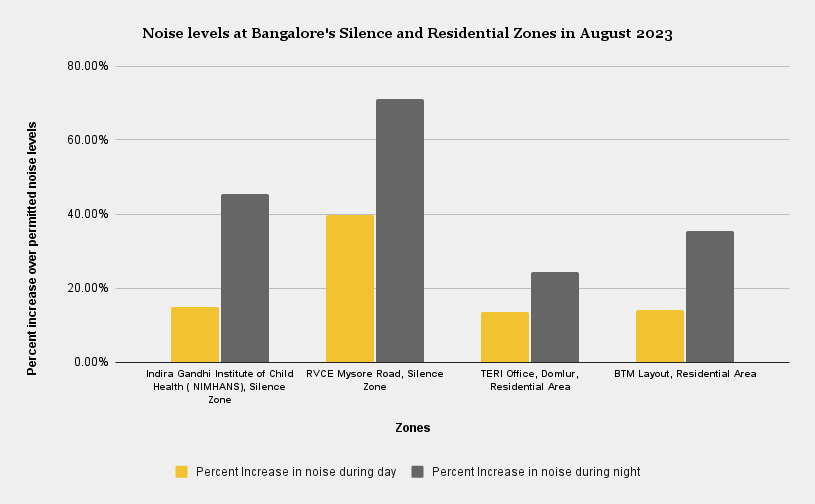Noise levels exceed permitted levels set by the Karnataka State Pollution Control Board (KSPCB) in the silence and residential zones of the city.
Noise levels are exceeding limits set by the KSPCB at many places in Bangalore, according to data published by the board. The KSPCB monitors noise levels at 10 Continuous Noise Monitoring Stations in Bangalore, which include two silence zones, three residential areas, three commercial areas and two industrial areas. In August, the Rashtreeya Vidyalaya College of Engineering (RVCE) in the Mysore Road area, considered a silence zone by the KSPCB, recorded a 71 percent increase over the permissible level of noise at night and 39.8 percent during the day.
The permissible noise limits for different zones are set by the KSPCB, as per their official circular. For silence zones, limits are set at 50 decibels (dB) during the day and 40 dB during the night. For residential areas, the limits are 55 dB and 45 dB during day and night respectively.
The Indira Gandhi Institute of Child Health, near the National Institute of Mental Health and Neurosciences (NIMHANS), which is also a silence zone, exceeded the permissible noise limit by 14.8 percent during the day and 45.5 percent during the night in the month of August. The RVCE Mysore Road silence zone recorded an average noise level of 69 dB, which exceeds the 40 dB limit significantly. The Energy and Resources Institute (TERI) office, Domlur and BTM Layout, both residential areas under KSPCB’s classification, exceeded the noise level limits by 24.2 percent and 35.3 percent respectively at night.

Ainesh Patnaik a first year student at the RVCE, Mysore Road, said that sounds from vehicle horns from the busy traffic in the area are at times distracting during classes.

Mr. Jayaprakash B, Assistant Scientific Officer at the KSPCB said that the main sources of noise pollution in Bangalore are industrial activities, construction, generator sets, loudspeakers, music systems, vehicular horns and other mechanical devices. He added that the KSPCB is undertaking several preventive measures to combat noise pollution. “We have 10 real-time noise monitoring stations in different zones. The monthly noise quality data is being displayed in our board website for mass awareness and we have VMS (Virtual Machine System) display board at Hudson Circle for the public.”

He added that the KSPCB has issued 108 Noise Level Meters (NLMs) to equip all police stations and the regional offices of KSPCB to address noise complaints.
Dr. Anilkumar P. Grampurohit, police inspector at the Traffic Management Centersaid that traffic police officers across the city book vehicles for installing and using shrill horns and defective or modified silencers. He informed that the fine imposed for such offences is up to Rs. 5000 for all vehicles. According to the enforcement statistics published by the Bengaluru Traffic Police (BTP), 167 cases of defective silencers have been booked this year under the Motor Vehicles Act, as of Aug. 31, 2023.
He also said that the BTP conducts occasional meetings with vehicle repair shop owners and others who deal in modified silencers and horns to discourage them from selling such illegal accessories. However, in many such meetings, the dealers have informed the BTP how customers demand the accessories despite the shop owners telling they will be booked by the police. “Customers tell the shop owners not to worry about the fines and just install the accessories in their vehicles, and they do that because they do not want to lose out on their income,” said Dr. Anilkumar. He added, “Bans and fines are necessary, but in the end it comes down to personal responsibilities and duties as residents.”
Mr. Raju Chalawadi, a traffic police officer stationed at Infantry Road said that the traffic police officers are responsible for checking horns, silencers, engine quality etc. to ensure that vehicles do not emit noise and contribute to noise pollution. He said, “We use a noise dosimeter on suspected vehicles to check the sound level, and if they exceed the recommended dB, we charge fines.”
Vishnu Gaonkar who runs a tea stall in the area said that continuous, loud vehicle horns irritate him and other customers coming to his stall. He said his shop has been there for almost a decade now, and with the increase in traffic in the area, the noise emitted from them has also increased. “It is the worst in the evening time,” he added.
Dr. Anirudh Gaurang Gudlavalleti, a senior research associate at the Indian Institute of Public Health, Hyderabad said that increasing noise levels have multiple health effects, the obvious ones being hearing damage, sleep irregularities, problems in communication and increase in stress.
He said, “The other set of problems which people aren’t very aware of are delayed or hampered cognitive development, high blood pressure and subsequent cardiovascular conditions.” He said that increase in noise can also lead to potential reduction in outdoor exposure leading to lower immunity, poorer quality of life and isolation, which again has adverse implications on mental health. “Additionally, it can cause severe harm to the wildlife (both flora and fauna) and thus an increase in noise levels is not only a human health problem.”




